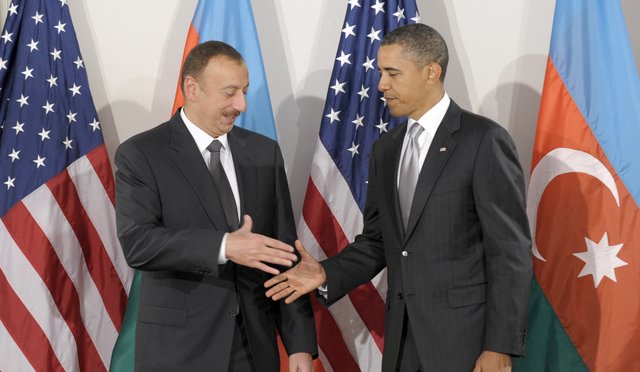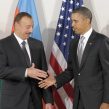
Azerbaijan’s Elections and the US-Azerbaijan Strategic Partnership
Publication: Eurasia Daily Monitor Volume: 10 Issue: 173
By:

The government of Azerbaijan wants the United States to exert greater influence in the South Caucasus, but is actually seeing less of it under the administration of President Barack Obama; and the ways of that involvement have not always been productive. Azerbaijan continues to believe in the value of its strategic partnership with the US, although that partnership’s deliverables flow basically one-way from Baku to Washington (see below), in an inverse ratio to the sides’ respective capacities to shape outcomes in this region.
Azerbaijan will hold a presidential election on October 9. With each presidential election at five-year intervals (and parliamentary elections every four years), Washington tends to cast the legitimacy of that process into doubt. The strategic partnership has to recover from these periodic stress tests.
Baku does not reject the core content of Washington’s election-related criticisms. It mainly objects to their form and method. The form errs toward lecturing, unless mitigated by more sensitive US ambassadors in Baku. The method (following that of the Organization for Security and Cooperation in Europe—OSCE) involves a static evaluation of each election’s negatives, seemingly overlooking gradual improvements between election cycles. US funding and other support to circles of the radical opposition contributes to a perception of bias. This partially explains why the government in Baku meets Washington’s criticisms with some skepticism. Beyond debates over process, however, election outcomes indisputably reflect high ratings of President Ilham Aliyev’s performance and the country’s rapid economic development with every election cycle thus far.
In the run-up to this election, Baku blocked a visit by US Deputy Assistant Secretary of State for Democracy, Human Rights and Labor, Thomas Melia, who was to have led a US delegation to Azerbaijan. The delegation had intended to observe preparations for the election, and Melia’s bureau in the State Department had traditionally criticized the government of Azerbaijan (Turan, September 19).
Those were not, however, Baku’s main reasons for cancelling that visit. The government of Azerbaijan feels that senior-level US visits to the country do not sufficiently reflect the commonality of strategic interests, nor the priority status that should be attached to those interests within the overall US-Azerbaijan relationship.
President Aliyev’s top foreign policy adviser, Novruz Mammadov, held talks on September 18 in Washington with US Deputy Secretary of State William Burns to express some of Baku’s concerns. These go beyond election assessments. Three days after his Washington visit, Mammadov cautioned against a possible “repeat of the 2009 mistakes. There are such attempts these days.” He referenced the Zurich Protocols, which the Obama administration had helped mediate between Turkey and Armenia in 2009, severely if temporarily damaging US-Azerbaijan relations. “We do not want this to occur a second time,” Mammadov told the Turkish press (Hurriyet, September 21).
The Zurich protocols ultimately shattered against joint Azerbaijani-Turkish resistance, but only after Ankara had reconsidered those proposals and Yerevan reneged on its side of the deal with Washington. Under those documents, Turkey was to have opened its border with Armenia for commerce and transportation, no longer conditioned on the withdrawal of Armenian troops from certain districts of Azerbaijan. The US proposal was to break that conditionality and remove Azerbaijan’s only peaceful lever that could incentivize a phased withdrawal of Armenian troops, pending a future determination of Upper Karabakh’s status. The Zurich protocols, if implemented, would have encouraged Armenia to continue the occupation of Azerbaijani territories beyond Upper Karabakh. By persuading Ankara temporarily to go along with the Zurich protocols, Washington broke Turkish-Azerbaijani solidarity, which Ankara has restored since then. Azerbaijan and Turkey hold the position that they could jointly open their borders with Armenia for trade and transportation, conditional on a phased withdrawal of Armenian troops.
Yerevan has recently decided to join the Russia-led Customs Union, repudiating the European Union’s offer to conclude association and free trade agreements with Armenia. Government circles in Azerbaijan are concerned about possible attempts to resurrect the 2009 Zurich proposals, newly rationalized as seeking to “retrieve” Armenia from Russia’s economic bloc, once again at Azerbaijan’s expense (Today’s Zaman, September 22).
For more than a decade, Azerbaijan has provided unrestricted ground, air and sea transit access for US and North Atlantic Treaty Organization (NATO) forces to and from Afghanistan and other theaters. Furthermore, Baku assists US counter-terrorism, counter-proliferation, and intelligence-gathering efforts in the region. In Washington last month, US Defense Secretary Chuck Hagel and Azerbaijan’s visiting Defense Minister Safar Abiyev mapped out further joint work on those issues (Pentagon press release, August 5). Azerbaijan supplies US allies in Europe, Turkey and Israel with oil and, in prospect, natural gas, helping to reduce their dependence on Russia. The Obama administration applauds Azerbaijan’s partnership with the European Union on energy supplies. Following its failed promotion of “moderate Islam” in a number of Muslim countries, the Obama administration might rediscover Azerbaijan’s exemplary value as a Western-oriented, successfully developing Muslim secular state.
Baku expects a greater degree of reciprocity from Washington for a two-sided strategic partnership. If perceived as taken for granted by one of the sides, such a partnership will find it increasingly hard to overcome the stress tests, and can ultimately erode. First and foremost, Baku expects US re-engagement as an honest broker to facilitate a resolution of the Armenia-Azerbaijan conflict. Baku regards its strategic partnership with Washington as inherently more important to both sides, compared with their divergent assessments of Azerbaijan’s election processes. In turn, the US evaluation will meet with greater credibility by acknowledging Azerbaijan’s successful development as the premise.




